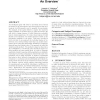Free Online Productivity Tools
i2Speak
i2Symbol
i2OCR
iTex2Img
iWeb2Print
iWeb2Shot
i2Type
iPdf2Split
iPdf2Merge
i2Bopomofo
i2Arabic
i2Style
i2Image
i2PDF
iLatex2Rtf
Sci2ools
115
click to vote
PODS
2006
ACM
2006
ACM
From statistical knowledge bases to degrees of belief: an overview
An intelligent agent will often be uncertain about various properties of its environment, and when acting in that environment it will frequently need to quantify its uncertainty. For example, if the agent wishes to employ the expectedutility paradigm of decision theory to guide its actions, she will need to assign degrees of belief (subjective probabilities) to various assertions. Of course, these degrees of belief should not be arbitrary, but rather should be based on the information available to the agent. This paper provides a brief overview of one approach for inducing degrees of belief from very rich knowledge bases that can include information about particular individuals, statistical correlations, physical laws, and default rules. The approach is called the random-worlds method. The method is based on the principle of indifference: it treats all of the worlds the agent considers possible as being equally likely. It is able to integrate qualitative default reasoning with quantit...
Related Content
| Added | 08 Dec 2009 |
| Updated | 08 Dec 2009 |
| Type | Conference |
| Year | 2006 |
| Where | PODS |
| Authors | Joseph Y. Halpern |
Comments (0)

